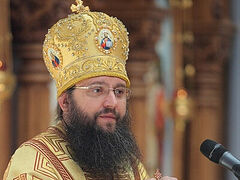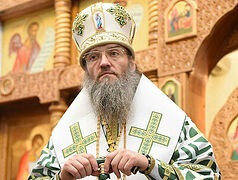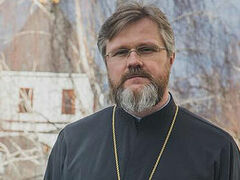Today there are twenty educational institutions in the Ukrainian Orthodox Church, including seven seminaries and one academy. On the whole, an optimal and geographically balanced structure of theological schools has taken shape in the Church. True, now there are fewer people wishing to study in seminaries than a few years ago. The reason for this is the demographic problem and rise in opportunities to travel abroad since the Schengen visa a “the visa-free regime” was opened to Ukrainian citizens.
—There are several factors at play here. There are fewer applicants in all universities due to the population decline and the fact that there are many abortions, with few deciding to have children. The second factor is that there is no great demand for theological education now, as there was in the 1990s. Apparently, a considerable number of people in the USSR wanted to serve the Church, but couldn’t do it. So when the opportunity arose, they went to study in theological educational institutions. There were a great number of applicants.
Now there are very few such (adult, mature) people among the applicants. Mostly high school graduates come. Of course, the advantage is that they usually come from their parents and have not yet had time to besmirch themselves with the sins of this world. On the other hand, some don’t have any positive life experience or spiritual strength. They graduate from seminary at the age of twenty-three or earlier. In today’s reality, at this age a person is not yet fully psychologically developed and isn’t ready to get married or start a family, and is still less prepared to take on the responsibility of the priesthood.
—How is the issue of human resources resolved in educational institutions? Is there a shortage of teachers with master’s and doctoral degrees?
—There is a problem with doctoral degrees. Of course, there is also a problem with master’s degrees in the provinces. I think it’s the same everywhere. For example, secular regional universities also have a shortage of specialists with academic degrees. Sometimes there are situations when someone from Kiev holds a doctoral degree and works in five regional universities simultaneously.
—I also travel to different regions in Belarus to teach—from the Brest region to the Vitebsk region.
—But you actually travel to teach. But in our secular universities there are fictitious things, when a person is officially a staff member but doesn’t turn up for work. However, since our seminary degrees are still unaccredited, the percentage of academic degrees is not so important for us. But we understand that it is necessary to raise the standards for teachers. The trouble is that now there is no centralized system for funding religious educational institutions. Seminaries are established by dioceses, which are also responsible for them, including financially. And this has a negative impact on human resources. This is a universal church problem, and I am not able to change anything here, although I have mentioned this issue publicly.
—Since, as you said, your seminaries are supported and funded by dioceses, do problems arise in your theological educational institutions from the differences in curricula?
—We try to standardize our curricula and course syllabi as much as possible. But not every educational institution can fully implement them. There are, of course, the traditional long-established subjects, such as the New Testament, the Old Testament, dogmatic theology... There should be no variations in education here—the content should be as meaningful as possible; it should correspond to the teachings of the Orthodox Church, explain these teachings to students, and mold a person into a responsible Orthodox Christian.
But there are other subjects where variations are possible. For example, missiology. Perhaps this subject will be taught with its own distinctive features in the Poltava Theological Seminary, which has a missionary orientation. Actually, the curricula used to be significantly different, and difficulties arose for the students who for some reason were transferred from one seminary to another. So we have come to the conclusion that unification is needed, and now we are working on this.
Diocesan life
The Nizhyn diocese is an of the ordinary dioceses of the UOC-MP, and largely reflects the processes taking place in the life of the Church, including its relationship with the authorities. Vladyka Kliment has been its ruling bishop for over four years now—sufficient time to draw his first conclusions.
—As we get through another day, we thank God for this day. For me, the theological understanding of the relationship between the Church and the State is of particular interest. The Church as the place where there is a special manifestation of God’s work in the world is always opposed to the State’s own aims. There has never really been true symphony between them in history. True, there were attempts to implement a “two-headed” State institution and appropriate symbols were created for this purpose, but the internal essence of such institutions was far from a parity relationship. Presidents, governors and ministers may be believers and Christians, but the Church and the world will still remain different. And you need not look for harmony where it doesn’t exist and cannot exist in principle... People change as well. President Poroshenko was very different at the beginning and at the end of his presidential term. I don't know who suggested to him the idea of walking all over our Church. But when the pressure on the UOC-MP began, there was simply no one to complain to. Everyone had clear instructions on how to work with the UOC-MP and how to treat us. For several years now the new statutes of our parishes, dioceses, monasteries and educational institutions haven’t been registered. New parishes, monasteries and convents are being set up in the country, but no one is registering them—they are outside the legal framework.
—That is, they cannot get legal entity status?
—No, they can’t. They keep threatening us that they will lift the restrictions on the operation of the “Law on the Renaming...” and put it into force. What does this mean for us? We don’t want to be renamed the “Russian Church in Ukraine”—we want to remain the Ukrainian Church of the Moscow Patriarchate. This means that our statutes will be annulled. We will no longer be able to conclude contracts for the lease of premises, including architectural monuments. Many of our churches, monasteries and convents are architectural monuments. But suppose we agree to the renaming and call ourselves “The Russian Orthodox Church in Ukraine”, and re-register our charter (although I know an example of one parish where they wanted to have their charter re-registered in this way, but they weren’t allowed to). If we call ourselves the Russian Church, then who in Ukraine will conclude any agreements with us? While all the documents will be redone, I think that the redistribution of property will begin and our Church will lose a significant part of what it has created and revived over the past thirty years.
A name is the last thing that is ever changed. My parishioners know which Church I belong to, who my Patriarch is and who the Metropolitan of Kiev is. And they already decided on this a long time ago. Even if I change my name, nothing will really change. But the State adopted this law in order to do away with the UOC-MP. This law is not for renaming—it is aimed at liquidating the UOC-MP. Like the “sword of Damocles”, it hangs over the Church. “If you misbehave, the restrictions imposed by the District Court can be lifted by the decision of some official.” And that’s all—it’s all downhill from there.
—You have noted that the statutes of your parishes and monasteries have not been registered for several years now. But how can they then carry out their activities without having legal entity status?
—That is right. But what are our activities? Celebrating the Liturgy, hearing confessions, administering Holy Communion... This doesn’t necessarily require legal entity status. It’s another matter that this status is required in other cases. Here everything is solved in different ways. For example, the owner of a church is not a religious community (parish), but an individual or a diocese. Now our dioceses are legal entities, so if the parish is not registered, all contracts can be drawn up with a diocese. Unfortunately, we have to spend much time looking for different options, given the difficult conditions we have found ourselves in.
—Have any parishioners left churches of your diocese since the establishment of the OCU?
—No, we haven’t had an outflow of believers. Of course, the only thing that has had a negative impact was the coronavirus epidemic. This was a serious challenge for the Church. And I think it is much more serious than the emergence of the OCU, because it was a mental challenge, as it were. There was the following propaganda: “Don’t go to church because churches are a source of infection.” But at what moment will it be possible to go to church? Through this poison they have done their dirty work on contemporary people whose god is the TV. And today we need a new mission, a post-coronavirus one. Unfortunately, some priests are afraid to carry out their ministry. Although history knows cases (e.g., New Hieromartyr Vladimir (Bogoyavlensky)) when clergy went to typhoid patients, to cholera barracks... Now this is not required of priests. But thank God, in Ukraine, unlike other countries, our priests were not forbidden to celebrate services. In Austria, for example, even Baptisms were prohibited. But such a prohibition is essentially anti-Christian.







